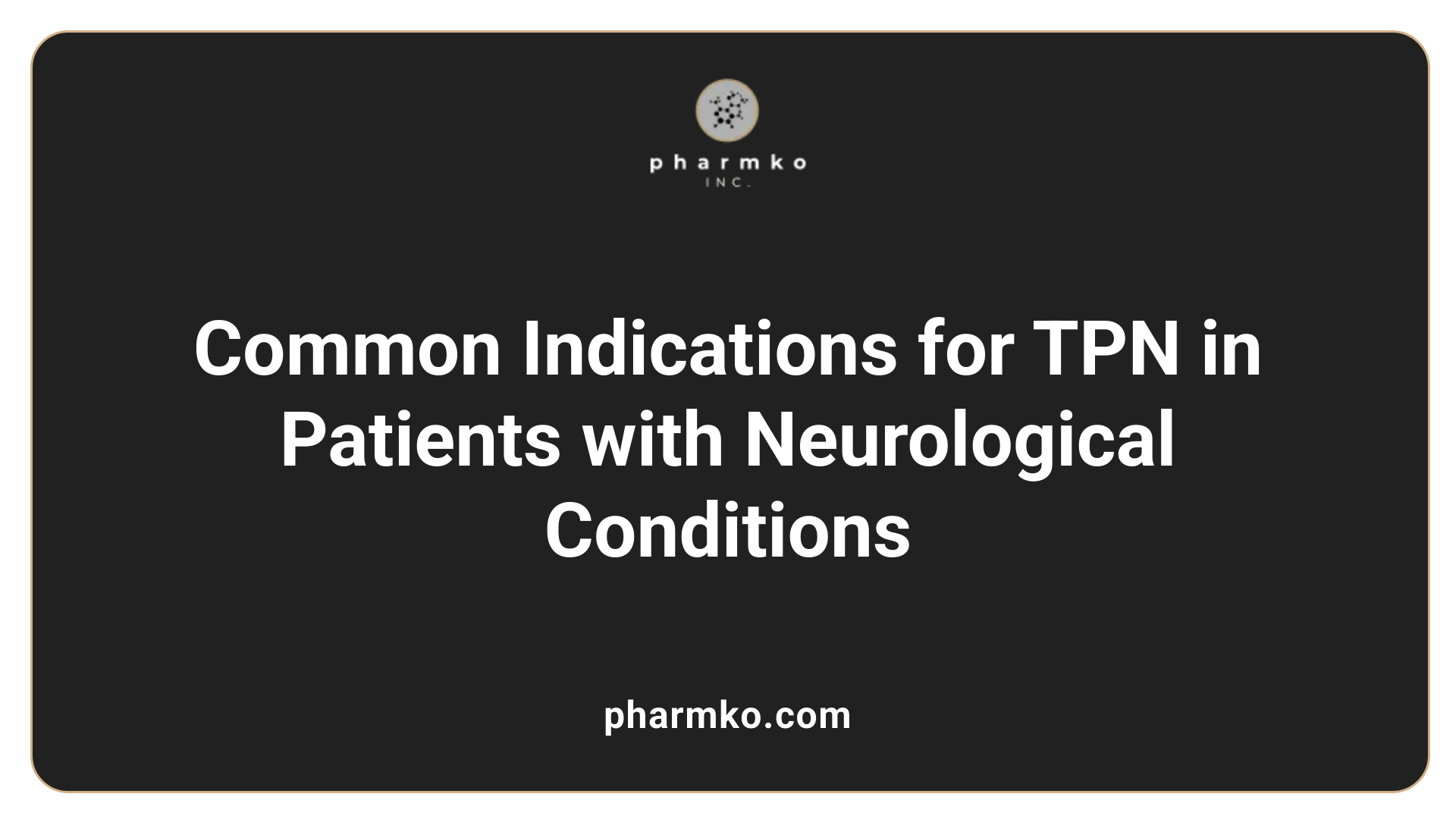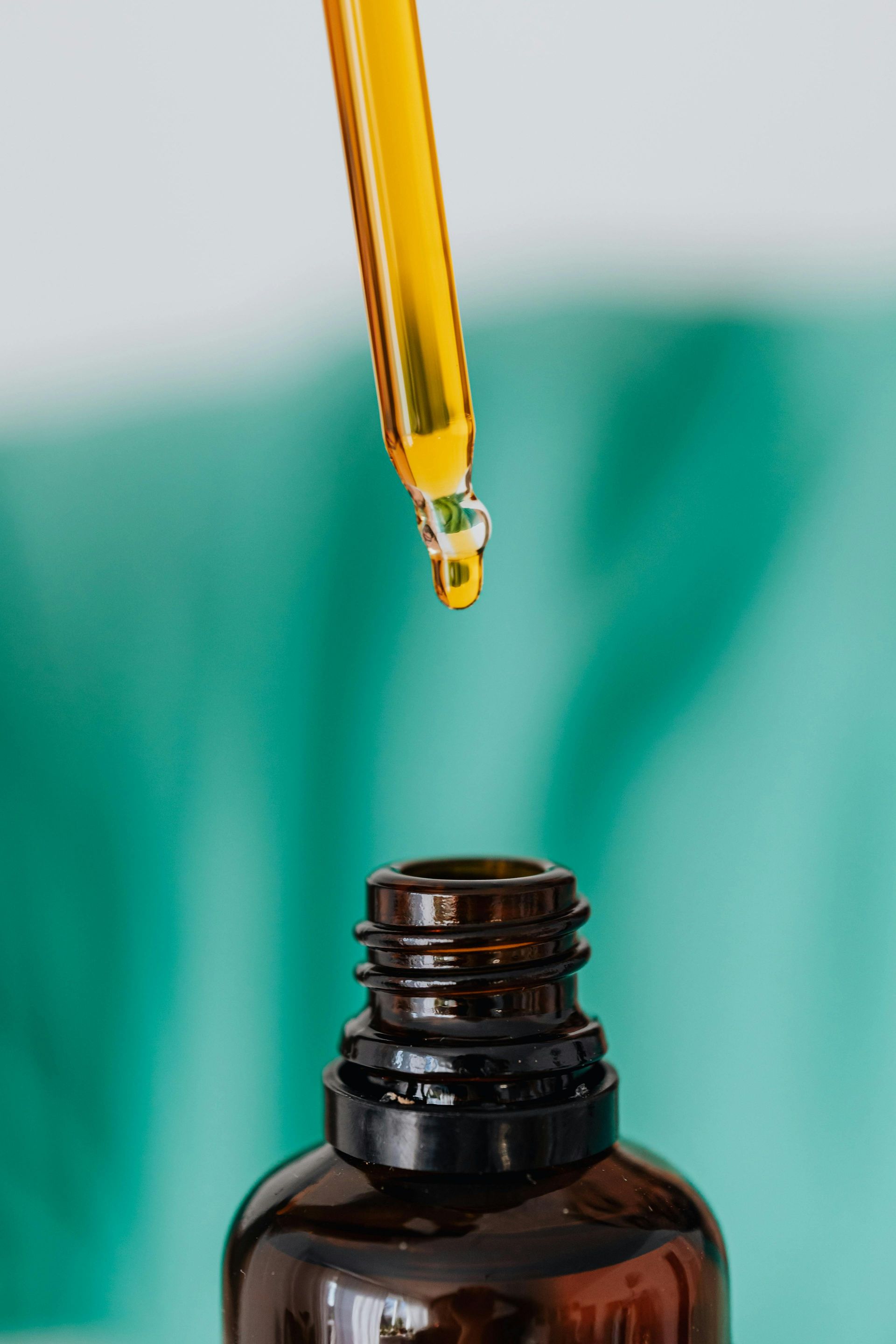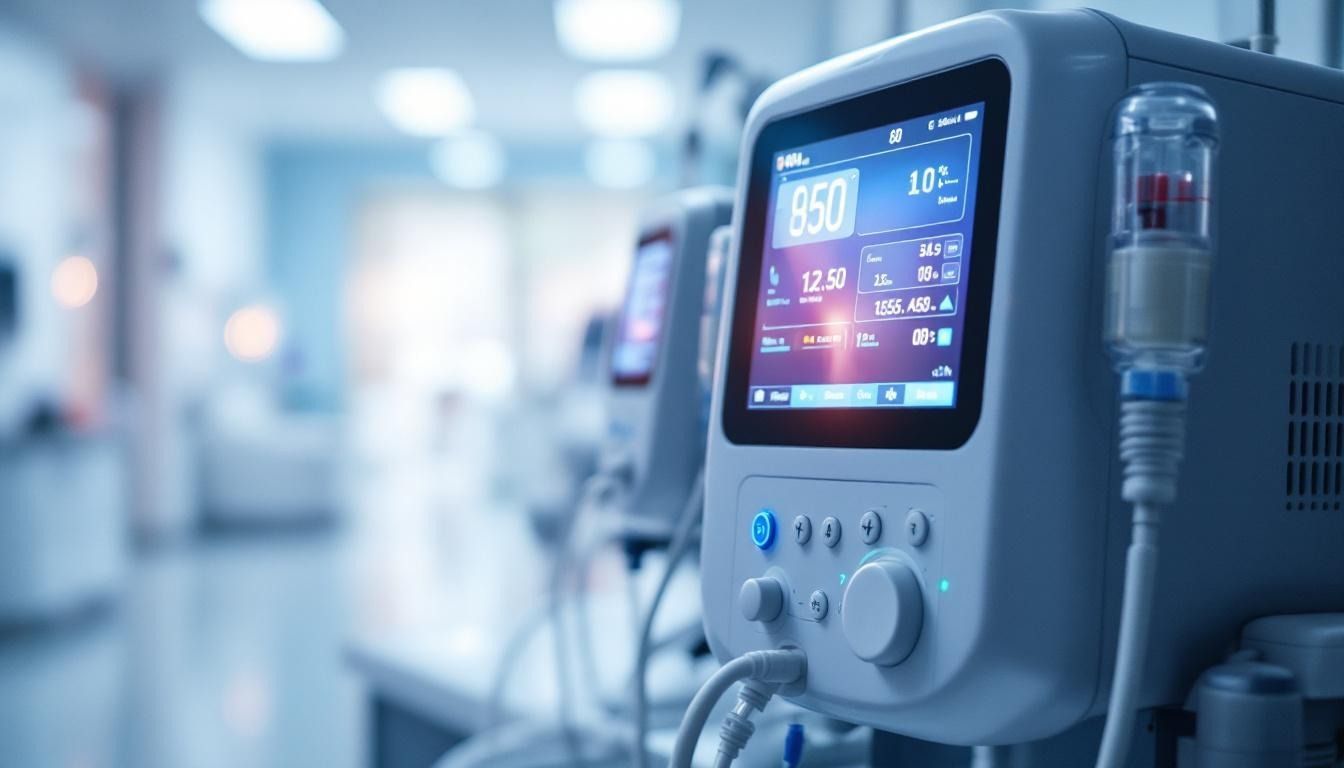How TPN Supports Women with Neurological Conditions
Understanding the Critical Role of TPN in Neurological Care for Women
Total Parenteral Nutrition (TPN) is a vital medical intervention supporting women with various neurological conditions, especially when traditional feeding methods are unfeasible. This article explores how TPN facilitates neurological health, the mechanisms involved, and clinical considerations necessary for optimizing outcomes.
Conditions Requiring Total Parenteral Nutrition (TPN) in Neurological Care

What conditions typically require total parenteral nutrition (TPN)?
Total parenteral nutrition (TPN) is primarily used for patients who cannot meet their nutritional needs through oral or enteral routes due to gastrointestinal dysfunctions or other medical conditions. Common situations include bowel obstructions, fistulas, severe Crohn’s disease, gastrointestinal cancers, and intestinal failure. TPN also supports severe malnutrition, post-gastrectomy states, and patients with short bowel syndrome where absorption is compromised.
The main goal of TPN is to provide essential nutrients directly into the bloodstream, facilitating recovery and enabling a transition back to oral or enteral feeding when possible. Despite its benefits, TPN comes with risks like infections and metabolic disturbances, but with specialized care and monitoring, these can be minimized.
Who can benefit from TPN therapy?
Patients with nonfunctional gastrointestinal tracts, critical illnesses, or those who are unable or unsafe to eat orally over extended periods may benefit from TPN. It delivers proteins, carbs, fats, vitamins, and minerals directly into circulation, supporting vital functions and aiding recovery.
How is TPN administered as a therapy?
TPN involves the infusion of a specially prepared nutrient formula through a central or peripheral vein using sterile techniques. It can be administered on a short-term basis, such as days or weeks, or for long-term or even lifetime support, depending on the patient’s condition. Administration involves the use of infusion pumps to regulate flow rates and ensure proper nutrient delivery.
What are considerations and protocols for nutritional support in patients requiring TPN, especially those with neurological conditions?
When providing TPN to neurological patients, careful assessment of nutritional requirements—including caloric, protein, electrolyte, and vitamin needs—is essential. Regular monitoring helps detect deficiencies or imbalances that could impair neurological recovery.
Protocols should incorporate multidisciplinary collaboration among neurologists, dietitians, pharmacists, and nursing staff. Adjustments to the TPN formula must be tailored to the patient's condition, metabolic demands, and potential complications like infections or liver issues. Refeeding protocols should be gradual to prevent metabolic disturbances, particularly in malnourished neurological patients.
What are the key elements of TPN patient education?
Patients and caregivers should understand the purpose of TPN therapy and its role in supporting nutritional needs when enteral feeding isn’t possible. Education emphasizes infection prevention, including hand hygiene and catheter care, and recognition of signs of complications like fever, redness, pain at the catheter site, or metabolic issues.
Proper handling, preparation, and storage of TPN solutions are critical for safety. Patients should be trained on the operation of infusion devices and aseptic techniques. Ongoing communication with healthcare providers is vital for monitoring and adjusting therapy.
What is the role of TPN in preventing or managing neurological complications related to nutritional deficiencies?
In neurological conditions where oral intake is compromised, TPN ensures continuous delivery of essential nutrients—glucose, amino acids, electrolytes, vitamins, and minerals—that support brain function, neurological repair, and prevent deficits.
It helps avert complications like cognitive impairment, neuropathy, seizures, or coma caused by deficiencies. Careful management and monitoring are necessary to avoid TPN-associated risks, but overall, it is a critical tool in safeguarding neurological health during critical illness.
| Condition | Typical Indication for TPN | Notes |
|---|---|---|
| Bowel obstruction | Non-feasible enteral feeding | Requires surgical intervention in some cases |
| Severe Crohn’s disease | Intestinal failure or severe malabsorption | May be temporary or long-term support |
| Gastrointestinal cancer | Obstruction or resection sites | Adjunct to chemotherapy or aimed at nutritional stabilization |
| Critical illness or surgery | Inability to tolerate enteral nutrition | Usually short-term, needs close monitoring |
| Short bowel syndrome | Malabsorption of nutrients | Long-term support often necessary |
| Malnutrition due to illness | When oral or enteral feeding is insufficient | Supports recovery and immune function |
Understanding the circumstances under which TPN is indicated helps in optimizing neurological care, especially in patients with compromised gastrointestinal function or severe nutritional deficits that impact neurological recovery and overall prognosis.
Integration of TPN in Multidisciplinary Neurological Patient Care

What are considerations and protocols for nutritional support in patients requiring TPN, especially those with neurological conditions?
Providing nutritional support to neurological patients requiring total parenteral nutrition (TPN) involves a thorough assessment of their unique needs. Clinicians must evaluate caloric, protein, electrolyte, and vitamin requirements carefully, reflecting the metabolic changes associated with neurological injuries. Regular monitoring is essential to detect deficiencies or imbalances early, especially because neurological conditions can alter metabolic demands and impair oral intake.
Monitoring involves laboratory tests for electrolyte levels, liver function, and indications of infection or catheter complications. Multidisciplinary collaboration among dietitians, neurologists, pharmacists, and critical care teams ensures tailored nutritional plans that support neurological recovery. Personalized TPN formulations, with gradual refeeding protocols, are critical for avoiding refeeding syndrome and ensuring safe advancement of nutritional support.
Table: Nutritional Support Protocols for Neurological Patients
| Phase | Timing | Nutritional Focus | Additional Considerations |
|---|---|---|---|
| Acute | Within 24-48 hours | Moderate caloric intake, early amino acids | Monitor for intolerance or complications |
| Recovery | After stabilization | Increased calories, protein, and micronutrients | Focus on wound healing and muscle preservation |
| Long-term | As needed | Tailored to metabolic response | Adjust based on ongoing assessments |
What is the importance of early nutritional intervention in neurological outcomes?
Early initiation of nutrition, whether via enteral or parenteral routes, is crucial in neurological care. Starting nutritional support promptly can prevent malnutrition, which impairs immune function, delays wound healing, and worsens neurological recovery.
Adequate nutrition supports ongoing brain repair, reduces muscle wasting, and decreases infection susceptibility. For conditions such as traumatic brain injury (TBI) or stroke, early feeding correlates with reduced mortality and improved neurological status. Thus, integrating early nutrition support into treatment protocols is essential for maximizing recovery potential.
How do complications from TPN, such as lipids administered intra-arterially, affect neurological health?
Administering TPN lipids or other nutrients intra-arterially due to misplaced catheters can have catastrophic effects. Lipid embolism entering cerebral circulation can cause ischemic strokes or widespread brain injury.
In one documented case, a misplacement of a central line resulted in lipids being infused into the arterial system, leading to multiple ischemic brain lesions visible on imaging. Immediate removal of the malpositioned catheter and surgical intervention were necessary to halt further damage and facilitate recovery.
This incident underscores the importance of precise catheter placement, continuous monitoring during TPN infusions, and immediate action upon signs of neurological compromise. Protocols and checklists should be rigorously followed to prevent such severe complications.
How does the individual assessment of energy expenditure influence TPN planning for women with neurological conditions?
Neurological injuries often cause significant variability in energy expenditure among women, influenced by factors such as hypermetabolism, fever, or inflammation. Accurate assessment methods, like indirect calorimetry, help determine individual caloric needs more precisely.
Overfeeding can lead to metabolic disturbances like hyperglycemia, hepatic steatosis, or respiratory difficulties, while underfeeding impairs recovery, increases infection risk, and delays neurological healing. Tailoring nutritional support based on individual assessments ensures an optimal balance that supports neuroprotection and functional recovery.
In summary, a comprehensive, multidisciplinary approach—early intervention, vigilant monitoring, and individualized planning—enhances the effectiveness and safety of TPN in neurological patients, especially women with specific metabolic and physiological considerations.
Implementing Nutritional Support Protocols and Education in TPN Care for Women
What are the key elements of TPN patient education?
Effective patient education is fundamental to safe and successful TPN therapy, especially for women with neurological conditions. Patients should understand that TPN supplies essential nutrients directly into their bloodstream when their gastrointestinal system cannot be utilized effectively. They need detailed instructions on maintaining the sterile environment for line care, including handwashing and preventing infection.
Patients should also be able to recognize early signs of complications, such as redness, swelling, fever, or changes at the catheter site, which could indicate infection. Understanding the proper use of infusion pumps, aseptic techniques, and storage practices for TPN solutions ensures safety.
Ongoing communication with healthcare providers, adherence to monitoring schedules, and being aware of nutritional goals are crucial components taught during patient education sessions. Empowering women with knowledge helps improve compliance and reduces risks during long-term TPN use.
What is the importance of multidisciplinary collaboration in TPN management, especially for women with neurological conditions?
Managing TPN in women with neurological disorders requires a team approach. Physicians, dietitians, pharmacists, nurses, and mental health professionals work together to develop individualized care plans. This collaboration ensures that nutritional strategies support neurological recovery, prevent complications, and adapt to changing clinical conditions.
Such coordinated care helps in early detection of problems like catheter complications, metabolic disturbances, or infections. For women recovering from stroke or traumatic brain injury, personalized nutrition management can influence outcomes significantly, promoting better functional recovery and quality of life.
Teamwork also reinforces education, adherence, and timely adjustments to TPN formulations, ultimately supporting safer and more effective therapy.
How does ongoing monitoring and adjustment enhance the safety and effectiveness of TPN therapy?
Regular clinical assessments and laboratory testing are vital to monitor parameters such as electrolyte levels, liver function, blood glucose, and nutritional status. For women with neurological conditions, maintaining a stable internal environment supports neurological healing and prevents additional complications.
Adjustments to TPN formulations based on these results ensure that patients receive appropriate caloric and protein intake without risking hyperglycemia, electrolyte imbalances, or liver toxicity. Close monitoring allows healthcare providers to tailor therapy, optimize outcomes, and reduce the risks associated with long-term TPN.
When properly managed, ongoing assessment promotes effective nutrition delivery, supports neurological recovery, and minimizes adverse effects.
What are best practices for reducing infection risks during TPN administration?
Preventing infections begins with strict aseptic technique during catheter insertion, handling, and maintenance. Regular site care, using sterile gloves and dressings, helps prevent bacteria from entering the bloodstream. Hand hygiene is critically important for anyone managing TPN.
Dedicated, trained staff should handle TPN preparations and infusion processes, following strict protocols. Educating patients and caregivers on recognizing signs of infection, such as redness, swelling, or fever, and encouraging prompt medical consultation are essential.
Following institutional guidelines for line care, regularly replacing administration sets, and minimizing line manipulations further reduce infection risks. These practices are especially vital in women with neurological impairments, who may have compromised immune responses or increased vulnerability to complications.
Additional insights: TPN management in women with neurological conditions
| Aspect | Recommendations | Considerations |
|---|---|---|
| Nutritional goals | Tailor caloric and protein intake to phase of illness | Monitor for hyperglycemia and electrolyte imbalances |
| Monitoring | Regular labs for electrolytes, liver function, and glucose | Adjust TPN formulation accordingly |
| Infection prevention | Strict asepsis, site care, staff training, patient education | Early detection of signs of infection |
| Team collaboration | Multidisciplinary approach, shared plans, patient involvement | Promotes safety and improved outcomes |
| Complication management | Prompt response to signs of catheter issues, metabolic disturbances | Critical for neurological recovery |
In summary, comprehensive education, vigilant monitoring, and coordinated care are fundamental for optimizing TPN safety and efficacy in women receiving nutritional support for neurological conditions. Proper management can make a significant difference in their recovery trajectory and overall health.
Optimizing Outcomes through Tailored Neurological Nutritional Support
Total Parenteral Nutrition plays an indispensable role in supporting women with neurological conditions, especially when traditional enteral feeding is limited or contraindicated. Through careful assessment, multidisciplinary management, patient education, and vigilant monitoring, TPN can significantly improve neurological recovery, prevent complications, and enhance quality of life. As medical understanding advances, personalized TPN regimens will continue to evolve, ensuring that women facing neurological challenges receive the best possible nutritional and clinical care.
References
- TPN Contraindications: What You Need To Know
- Enteral Nutrition in Neurological Patients
- Neurological Complications
- Special Neurologic Patient Population and TPN
- Neurological symptoms after parenteral nutrition
- Restore+ | IV Nutrition Support at Option Care Health
- Total Parenteral Nutrition (TPN): Care Instructions
- Total parenteral nutrition: MedlinePlus Medical Encyclopedia
- Home Total Parenteral Nutrition (TPN)













